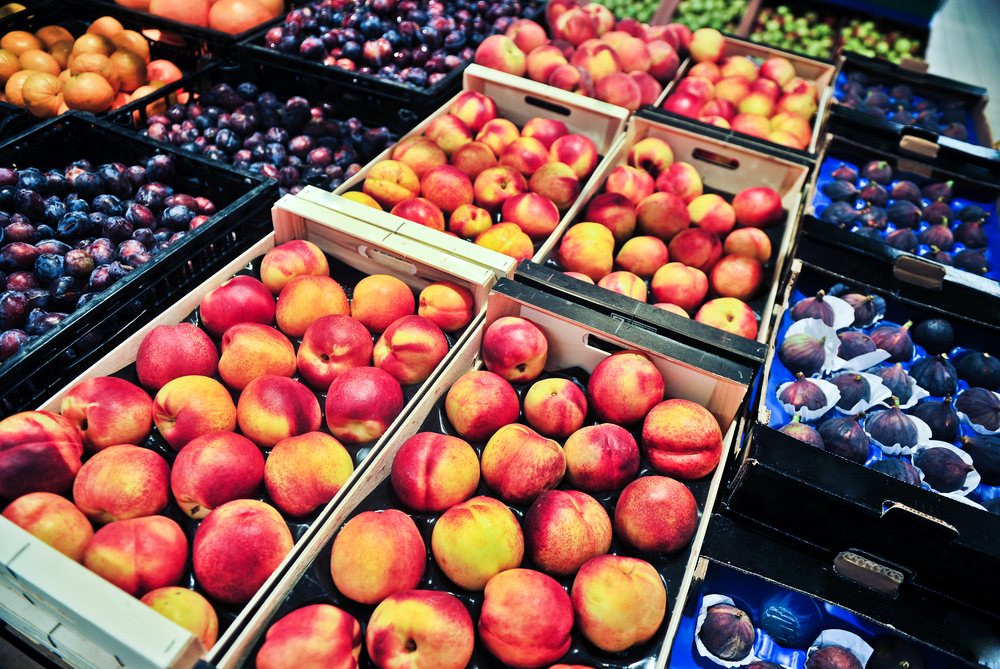
Summer offers a bounty of fresh fruits like no other time of the year. Most of our favorite fresh fruits are coming into their peak season, which is mid and late summer. Some of the most delicious foods that cross your lips yield enormous health benefits when you eat your daily allowances.
Here are 5 awesome summer season fruits burgeoning with nutrition and flavor for your enjoyment:
Watermelon
Most people know that this summertime favorite is low in calories and makes a great diet food, but it offers nutrients that you may not have suspected such as vitamin B1 and B6. B1 will help maintain electrolytes and nervous system functioning, and B6 helps turn foods into cellular energy. Beta carotene and vitamin A supplied by a healthy dose of watermelon is good for eye health. It’s a great source of major antioxidant vitamin C.
Stack lycopene on top of all of that, and you have cancer protection to boot! Heart-protecting potassium and magnesium are also in abundance in this delicious, red and pink treat.
Figs
The sad fact about figs is many people have never eaten a fresh one. The ones found in processed cookies are nothing at all like eating one picked from a tree and put directly into the grocer’s produce aisle or farmer’s markets where they can be found. There are many varieties of figs, with the most common two in local markets being Mission and Calimyrna. Figs are in their best form when the texture is like a ripe peach – slightly firm but not too mushy.
Figs are not only delicious, but they offer a multitude of life-sustaining nutrients such as vitamins A, E, K, and a host of B vitamins. Fresh figs, especially the black mission variety contain flavonoid anti-oxidants such as carotenes, lutein, and tannins that perform the duty of kicking out damaging free radicals. Calcium, copper, potassium, manganese, iron, selenium and zinc are some valuable minerals that are abundant in figs.
Peaches
Slurp on a sweet, ripe, juicy peach to get a low-glycemic delight filled with vitamins A, C, E, K and six of the B complex vitamins. The antioxidant vitamins work wonders for your vision and immune system and peaches also deliver a significant amount of fiber for preventing constipation and promoting colon health. Potassium is also present in peaches, which lessens cramps and potential for kidney disease and ulcers. Add to all of this magnesium, phosphorus, zinc, copper, manganese, iron and calcium to protect your bones, nervous system and support red blood cells. Stone fruits, such as peaches and plums which have pits, are also indicated as anti-inflammatory with the potential for reducing diabetic and metabolic disorder tendencies in prone individuals due to the phenolic compounds present in these fruits.
Peaches offer such health benefits that the Chinese symbolize peach trees are the tree of life, and the fruits symbolize immortality and unity.
Cantaloupe
The cool, voluptuous texture of a wedge or a chunk of cantaloupe is just what your palate craves when you feel hot enough to be a generator. This sweet member of the gourd family is a light way to integrate nutrition into dessert.
Cantaloupe is an excellent source of vitamin A, which is great for beautiful skin, and antioxidants that protect against colon, prostate, breast, endometrial, lung and pancreatic cancers. It contains antioxidant flavonoids such as zea-xanthin, which is absorbed into the eyes and works to filter out UV rays, which helps to prevent Age-Related Macular Degeneration (ARMD). A good serving of cantaloupe also affords some potassium, B-complex vitamins, and manganese.
Strawberries
These pretty, heart-shaped berries are a superfood that is appropriately shaped since they do so much to protect your heart. Numerous studies prove that strawberries increase your good (HDL) cholesterol, lower blood pressure and protect you from cancer because they are so high in antioxidants. They are very low in calories and impose a very modest glycemic load. They are high in vitamin C; only 8 berries deliver more than an orange.
Eating strawberries can also reduce your likelihood for age-related memory loss. In one longitudinal study, women over the age of 70 who had not had a stroke were interviewed to see how much of a given paragraph they could remember regarding details and the order of words or a list of numbers read to them. The interviews were done two years apart, and the researchers found that women who ate more berries had a slower rate of mental degeneration than women who ate fewer berries.
Don’t miss out on the summer harvest! Stock up on your favorite fruits before they go out of season and eat for your health!

